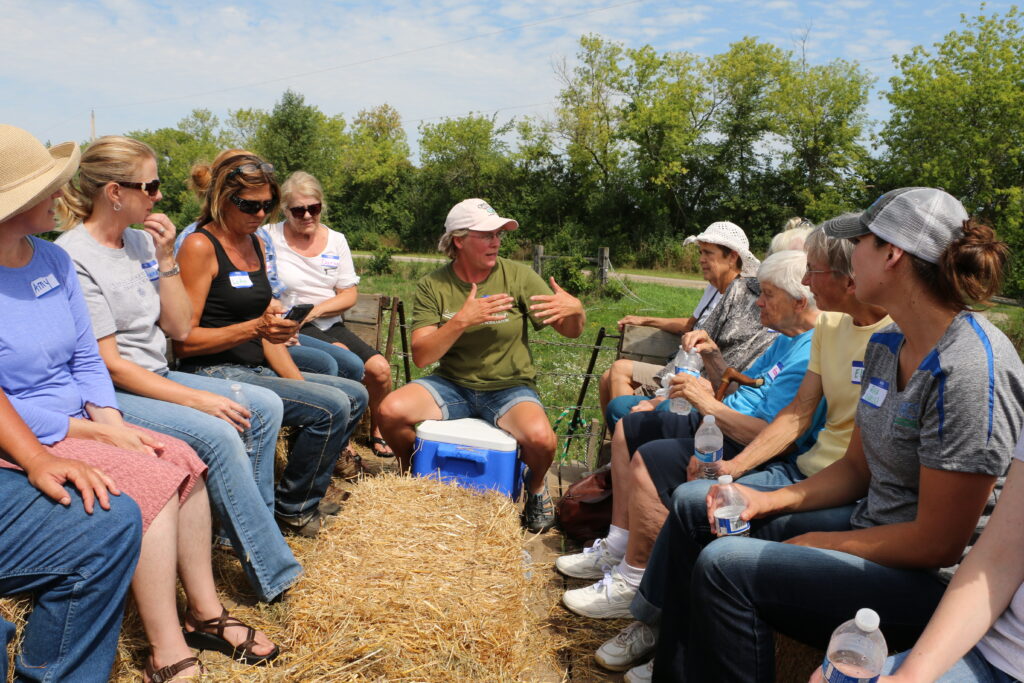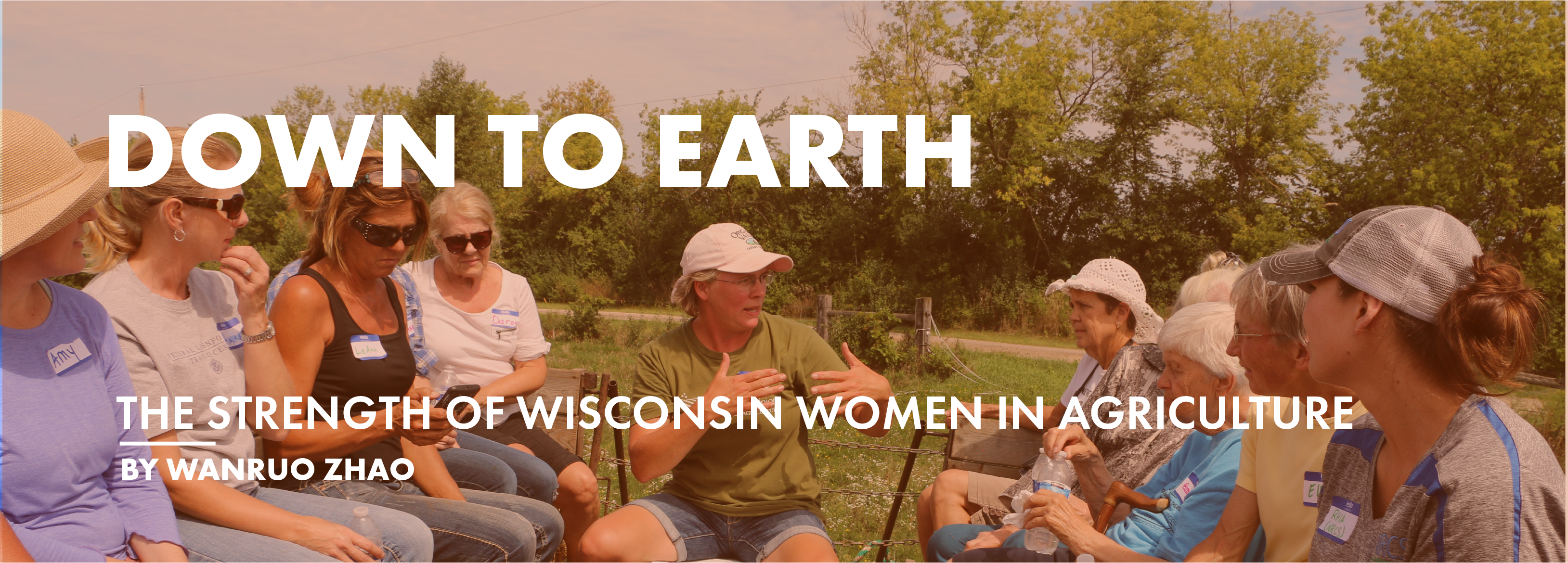Jennifer Nelson started to learn about conservation when she was a child in her mom’s garden.
When she grew up, Nelson and her partner bought farmland where trees, flowers, perennials, veggies and native grasses grew, and she spent nearly 15 years as an organic vegetable and cut flower grower.
But health problems kept Nelson from expanding her farm, so she turned to grazing — the practice of letting animals wander to eat grass and other vegetation — as a way to enjoy nature and great views of her farm.
Now, she’s sharing what she’s learned with other women farmers through Wisconsin Women in Conservation, where Nelson is a conservation coach. She invites other women landowners to learning circles at her farm so they can help each other by sharing practices and ideas.
This program is for women farmers and landowners who share a passion for conservation. While women landowners rarely have a community to connect with, they could benefit from sharing their knowledge and experiences of conservation practices with one another. Wisconsin Women in Conservation provides an opportunity for women farmers, landowners and conservation professionals to connect in different regions of Wisconsin through a variety of events such as learning circles, field tours and webinars.
“The goal of Wisconsin Women in Conservation is to help landowners, women landowners specifically, put conservation practices into place on their land,” says Elena Gutierrez Byrne, southwest coordinator for the group.
Wisconsin Women in Conservation was launched in 2020 and is led by the Michael Fields Agricultural Institute in partnership with Renewing the Countryside, Marbleseed and Wisconsin Farmers Union, according to their website. The institute is a nonprofit organization that works on farming and farm education.
Women account for 38,509 — about 35% — of all producers in the state of Wisconsin, according to the Wisconsin Women in Conservation website. These women receive implicit and explicit messages about their role in farming from education and experiences with government programs that affect their choice to farm, satisfaction in the job and their chances of success.
Aiming to empower and connect these women landowners, the Michael Fields Agricultural Institute wrote a proposal and brought on partner organizations in different regions of Wisconsin. Regional conservation coaches with years of conservation and farming experience do site visits with these women landowners. They share stories and tips related to conservation practices on their land, so new landowners can learn from their experiences. The coaches, as well as regional coordinators, connect women landowners with other organizations that can offer assistance, such as the Natural Resource Conservation Service.
At learning circles, like the ones held at Nelson’s farm, conservation coaches share their stories and help build a network of women landowners. The group also offers summer field tours held at a farm where conservation work has been done. Women farmers can then share knowledge from their farming experiences and teach others about conservation practices.
Women farmers not only learn the conservation practices for their farmland management and development but also for the health of the soil, water and wildlife.

Jennifer Nelson at Humble Pie Farm in Plum City: A learning circle at her farmland
In one learning circle this June, a group of women landowners came to Nelson’s Humble Pie Farm in western Plum City, and Nelson sat with them in a circle under her maple tree. Nelson shared the story of the farmland setup. She and her husband’s farm has grown bigger, though they have gradually scaled back with health and market challenges. They’ve experienced planting bedding plants, cut flowers and grazing animals, with their farm business accounting for 25% of their income. As a conservation coach, she is sharing her experience of building a farm business with women farmers.
Nelson shares other important advice from her farming experience — taking care of oneself and monitoring mental health. Nelson experienced burnout after working throughout her Lyme disease journey and stopped working for Marbleseed. She came back last year as a conservation coach.
“I really try to share that experience and how important it is that we are our greatest resource,” Nelson says.
Nelson feels comfortable with the peer-to-peer sharing environment at the learning circle instead of the traditional authoritative way of teaching. Nelson says it’s the future of learning — someone shares a story and women landowners learn from it.
During learning circles, the Wisconsin Women in Conservation team, experts and women landowners meet on farmland or at a park setting instead of their office, Byrne says. This informal setting makes these women more comfortable to ask questions and better understand the specific plans for their farmland.
In this story sharing process, Nelson provides women farmers with advice as a conservation coach, but she is also building some connections with these landowners as they are in the same farming community.
“An important part of this project is to build relationships with the women that we serve and to help build relationships among the women that we serve,” says Rebecca Christoffel, the project evaluator.
In addition to getting advice from conservation coaches, the Natural Resource Conservation Services, an agency of the U.S. Department of Agriculture has experts in the field who know about ecology and provide support for women landowners. These experts help build a bridge between women landowners and government agencies, Nelson says.
Nelson values this connection because she and her husband had an intimidating experience of getting a farm loan when they bought their first piece of land. Therefore, she feels conservation coaches could be helpful for women farmers.
“Even just finding a [government] conservationist that maybe is a woman and is willing to work with you or has experience working with other women can be super helpful,” Nelson says.
As a farmer, Nelson is still learning and taking advantage of the resources this program offers. She feels that Wisconsin Women in Conservation has helped her understand what it means to have a conservation plan. Many women landowners tend to see the big picture and that could be overwhelming, so it’s helpful to have professionals talk through all required steps to write a conservation plan, Nelson says.
But now this project offers opportunities for new landowners to learn about their conservation plan.
“It’s really helpful to have access to professionals that can talk you through all the steps required to write a conservation plan and implement some of those things,” Nelson says. “So it’s been great to have that support.”
Stacey Botsford at Red Door Family Farm in Athens: A field tour with women landowners
Stacey Botsford first became interested in conservation when she worked as a river rafting guide and saw irresponsible farming at work. She then decided to become a farmer after seeing responsible farming as a solution to the pollution problem.
Before returning home to Wisconsin, Botsford and her partner Tenzin apprenticed at an organic vegetable farm in Oregon to gain farming experience since neither had any previous experience. They then purchased a cornfield outside of Athens, Wisconsin and worked with their county’s Natural Resource Conservation Service staff. For the next few years, they planted windbreaks, cover crops and all beds on the contours of the land to reduce erosion.
It was her experience with conservation that led the Wisconsin Women in Conservation to recruit Botsford as a conservation coach.
In that role, Botsford mentors other women landowners in land stewardship, and she hosts field days on her farm to share her farming journey. She encourages women landowners to try things — even if they’re not perfect.
She talks about her farming journey as one filled with making mistakes. In addition to her vegetable farmland and wholesale business, she sells community supported agriculture shares, where about 220 families receive a box of vegetables weekly — almost like a subscription. Her experiences allow her to teach other landowners big lessons.
In addition to sharing her stories, Botsford gives women farmers practical advice in specific cases. Women farmers will show Botsford their maps and ask for her advice on how to manage certain aspects of the farm. Botsford gives examples of what conservation practices she has done on her land instead of answering big questions such as how to farm.
“For example, here we planted a row of trees to block the wind, and here’s where we planted some native grasses along the driveway,” Botsford says.
Through managing certain aspects of her vegetable farm, she’s able to help those who are interested in that type of farming. Those women farmers will contact her, and she will give feedback, Botsford says. For example, Botsford tells them vegetable rows should be planted on a contour, so there is no runoff, which solves a common problem on vegetable farms.
From a farmer’s perspective, Botsford likes that Wisconsin Women in Conservation creates a safe place for women since it provides women-only events where they can talk to experts and connect with each other. She saw male-dominated spaces when she went to different events and found women were less likely to participate when men and women were in the same space.
This left fewer opportunities for women to ask their questions about farming.
“[The space] was often dominated by the men in the room, and a lot of times women wouldn’t show up,” Botsford says. “When there are men and women together, the women participate less, and a lot of times the men like to take more space or change the topic to something that interests them more.”
However, Wisconsin Women in Conservation seeks to change that.
All photos by Kriss Marion
“I’ve enjoyed the way women communicate and are supportive of each other, and the different events that they’ve had have seemed really comfortable and welcoming,” Botsford says.
Botsford is proud to be a conservation coach because she meets many other farmers that also value the important work of farming, and she gets to connect with other like-minded people.
“It feels like the impact that I’m having is greater than my own farm by being able to share how to be a profitable farm and still hold conservation in the highest regard,” Botsford says.
